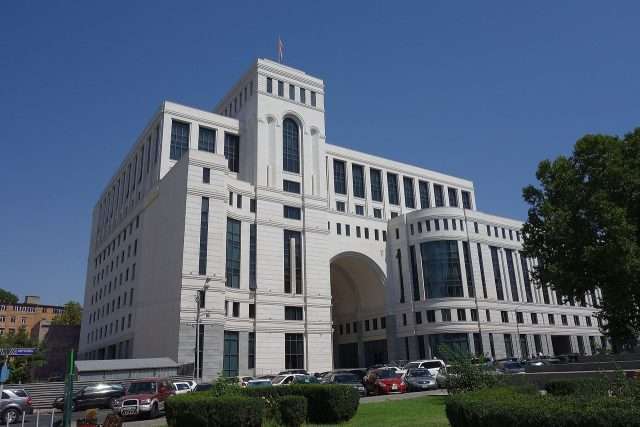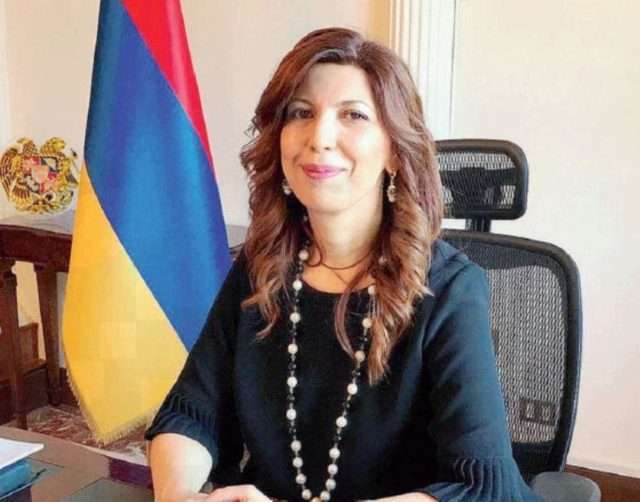Geopolitics and security of Armenia: an interview with H.E. Tsovinar Hambardzumyan

Kavkaz Files ISSN 2975-0474 Volume 9 Issue 5
Author: Silvia Boltuc
Since the 2020 Nagorno-Karabakh conflict, the Republic of Armenia has faced several domestic and foreign challenges which reflect the changing geopolitical scenario in the Caucasus. SpecialEurasia interviewed H.E. Tsovinar Hambardzumyan, the Ambassador of the Republic of Armenia in Italy, to discuss the current situation and possible future developments in Armenia.
What is the current political situation in Armenia after the latest 2021 parliamentary elections and the new Armenian President’s appointment?
“Over the last three years, Armenians have chosen democracy over any other alternatives. The first time was in 2018, following the non-violent Velvet Revolution, and the subsequent snap elections, and the second time was the elections in 2021, following the devastating war.
We are committed to the consolidation of democracy in Armenia through strengthening democratic institutions, and even more so after the aggression by our neighbours were realised the imperative of democratic development. By embracing transparency and accountability, we are committed to continuing our path toward institutional reforms and the implementation of policies that will build faith between Armenia and our partners abroad. I would like to note, in particular, the role of the European Union in supporting democratic reforms in Armenia. We are determined to develop further the dynamics that have emerged in our relations after the Comprehensive and Enhanced Partnership Agreement with the EU entered into force last year.
In our bid to consolidate our democracy, we are facing multiple challenges. Of course, the biggest challenge for us comes in the form of military threats to our security from beyond our borders. Armenia is located in a complex region, where geopolitical interests often clash, putting our country at the epicentre of contradictions and conflicting interests.
The Government is guided by the logic that the most effective security guarantee is peace. This is the reason why opening an era of peaceful development for our country and region has been adopted as a state strategy. The most important goal of the strategy is to create a regional and international friendly environment around Armenia.“
Armenian local sources have reported that the Baku Government periodically interrupted the electricity supply while Azerbaijani soldiers opened fire against civilians. Is there the possibilità that Azerbaijan will take advantage of the developments around Ukraine and the conflict will erupt again in the region?
“Azerbaijan had already escalated the situation both on the state border and in the Karabakh conflict zone. For three weeks, almost 100 000 people of Artsakh had no gas and electricity amidst freezing cold weather due to a ‘pipeline accident’ or deliberate explosion. The damage was in the Azerbaijani controlled section of Artsakh, and Azerbaijan was refusing to allow specialists to enter the area and fix the problem. The interruption of the natural gas supply has caused serious humanitarian repercussions in Artsakh, including the interruption of bread baking.
The most recent invasion, probably the worst violation by Azerbaijan after the Trilateral statement of November 9th, 2020, was on March 24th, 2022, when the Azerbaijani armed forces violated the line of contact with Nagorno-Karabakh in the area of responsibility of the Russian peacekeeping mission and infiltrated into the village of Parukh in Artsakh. These actions were preceded by Azerbaijan’s complete disruption of the only gas pipeline supplying Artsakh, by constant shelling of Armenian settlements and civilian infrastructure, terrorising threats towards the Armenians of Khramort village by loudspeakers urging them to leave their settlements, and other steps aimed at ethnic cleansing.
Moreover, in order to complete its pursuit of ethnic cleansing and to implement the policy of subjecting the Armenians of Artsakh to genocide with new vigour, Azerbaijan demands through its statements the withdrawal of the self-defence forces of the Armenian population of Nagorno-Karabakh. Along with the drastic escalation of the security situation in Europe, such actions by Baku seriously endanger regional stability and peace.
At the same time, Aliyev has been systematically using xenophobic hate speech directed against Armenians in his public speeches on a regular basis, Azerbaijani authorities are continuing to bring up the next generation in the spirit of ethnic hatred and dehumanisation of Armenians and presenting their distorted versions of history. Another manifestation of ethnic discrimination by Azerbaijan against Armenians is the damage to or appropriation of Armenian cultural heritage in Artsakh, including destroying Armenian monasteries, removing Armenian artefacts and denying the Armenian origin of the cultural heritage of Artsakh through erasing Armenian inscriptions and declaring them to be Caucasian Albanian, Russian or Udi.“

Does all this remain unnoticed by the world? What do you expect from the international community?
“The OSCE Minsk Group Co-Chair countries have delivered a clear assessment of the last escalation of the situation in Nagorno-Karabakh, acknowledging that it is a consequence of the movement of Azerbaijani troops. Of course, we expect similar assessments from the other countries as well. And it is important that the statements are targeted and addressed. Making an appeal to ‘both sides to cease such acts’ does not help. The appeal should be addressed to the aggressor.
Unaddressed statements have made Azerbaijan absolutely unpunishable especially now that the role of that country is increasing as an alternative gas supplier. We do not agree that the gas supply to Europe should take place at the expense of the blood of an Armenian soldier and turn a blind eye to Azerbaijan’s criminal actions.
Of course, we cannot say that such policies have gone totally unnoticed: the treatment of PoWs, hate speech and destruction of cultural heritage are reflected in the provisional measures that the International Court of Justice issued against Azerbaijan on December 7th, 2021. In September 2021, the Council of Europe’s Parliamentary Assembly (PACE) referred to this issue in a resolution focusing on the “humanitarian consequences of the conflict between Armenia and Azerbaijan.”. Also, on March 9th, 2022, the Resolution on the Destruction of Cultural Heritage in Nagorno-Karabakh was adopted by the European Parliament and strongly condemned Azerbaijan’s continued policy of erasing and denying the Armenian cultural heritage in and around Artsakh. The Resolution acknowledged that the erasure of Armenian cultural heritage is part of a wider pattern of a systematic, state-level policy of Armenophobia, historical revisionism and hatred toward Armenians promoted by the Azerbaijani authorities, including dehumanisation, the glorification of violence and territorial claims against the Republic of Armenia which threaten peace and security in the South Caucasus.”
There is an Armenian-Turkey reconciliation process. What do you expect?
“If we step back and take a look into the facts, we will see that every Armenian Government since 1991 has been open to normalising relations and setting up diplomatic relations with Turkey. We have always been of the opinion that establishment of diplomatic relations and opening of the borders is the minimum that two neighbors must have.
As you know, Armenia and Turkey have appointed Special Representatives for the dialogue aimed at full normalisation of the relations without preconditions, which have already met twice.
I can say that there are already positive signs in this respect – on March 11-12, 2022, Armenian Foreign Minister Ararat Mirzoyan took part in the Diplomatic Forum in Antalya. This is the first visit of a high-level official of Armenia to Turkey in a decade. Needless to mention that if the process of normalisation proceeds smoothly and we achieve positive results, mutual visits will be on regular basis.
But people are already benefiting from direct flights that have resumed between Yerevan and Istanbul. Opening of the borders will have its positive impact on the connectivity, trade and economic relations between the two countries, people to people contacts and overall peace and stability in the region.“
Do you like SpecialEurasia reports and analyses? Has our groundbreaking research empowered you or your team? Now is your chance to be a part of our mission! Join us in advancing independent reporting and unlocking the secrets of Eurasia’s complex geopolitical landscape. Whether through a one-time contribution or a monthly/yearly donation, your support will fuel our relentless pursuit of knowledge and understanding. Together, let’s pave the way for a brighter future. DONATE NOW and secure your place in shaping the geopolitical narrative.
